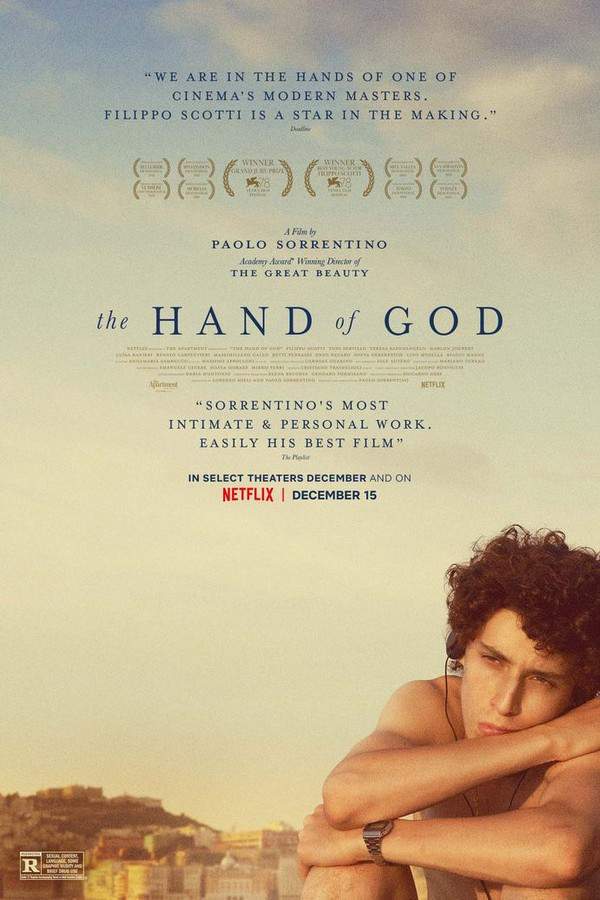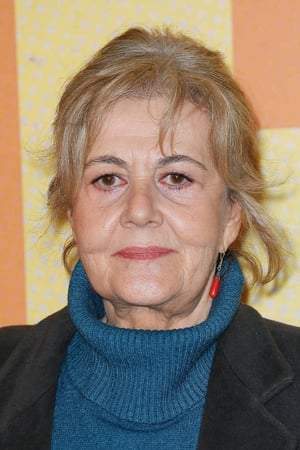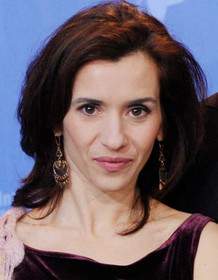The Hand of God 2021

In 1980s Naples, the life of young Fabietto Schisa is profoundly impacted by the arrival of football superstar Diego Maradona. Amidst a backdrop of both joy and tragedy, unexpected events shape his destiny. This deeply personal film from Academy Award-winning director Paolo Sorrentino explores themes of family, identity, and the role of chance, blending sports, cinema, love, and loss in a poignant and evocative portrait of a young man’s coming-of-age.
Does The Hand of God have end credit scenes?
No!
The Hand of God does not have end credit scenes. You can leave when the credits roll.
Meet the Full Cast and Actors of The Hand of God
Explore the complete cast of The Hand of God, including both lead and supporting actors. Learn who plays each character, discover their past roles and achievements, and find out what makes this ensemble cast stand out in the world of film and television.
External Links and Streaming Options
Discover where to watch The Hand of God online, including streaming platforms, rental options, and official sources. Compare reviews, ratings, and in-depth movie information across sites like IMDb, TMDb, Wikipedia or Rotten Tomatoes.
Ratings and Reviews for The Hand of God
See how The Hand of God is rated across major platforms like IMDb, Metacritic, and TMDb. Compare audience scores and critic reviews to understand where The Hand of God stands among top-rated movies in its genre.

The Movie Echo Score
In summary, The Hand of God delivers a visually striking and emotionally resonant portrait of youthful longing, anchored by Sorrentino’s distinctive cinematography and personal storytelling. Critics and audiences commend its charm, nostalgic atmosphere, and evocative score, while pointing to uneven pacing and a occasionally meandering structure. The film’s blend of intimate moments and episodic vignettes offers a memorable, if imperfect, coming-of-age experience that rewards attentive viewers. Consequently, the movie earns a solid but not flawless rating.
The Movie Echo Score Breakdown for The Hand of God

Art & Craft
Regarding art and craft, the film showcases Sorrentino’s signature visual flair through lingering shots, a sun‑drenched palette, and meticulous composition that immerses viewers in 1980s Naples. Critics note the exquisite cinematography and cohesive production design, though some find the editing uneven, contributing to a meandering flow. Overall, the craftsmanship is strong, providing a distinctive aesthetic that elevates the narrative.

Character & Emotion
In terms of character and emotion, performances convey a heartfelt, if occasionally subdued, portrayal of adolescence. Actors deliver nuanced moments that capture familial bonds and personal yearning, earning praise for authenticity. Some reviewers, however, describe certain portrayals as bland or lacking depth, diminishing emotional impact. Collectively, the character work is competent, offering enough resonance to anchor the film’s nostalgic tone.

Story & Flow
The narrative presents an episodic coming‑of‑age journey that mixes nostalgia with personal discovery. While many find the fragmented structure evocative of memory, critics also point to a lack of cohesive plot progression and occasional pacing lapses that render parts of the film meandering. This blend of strengths and weaknesses results in a story that is engaging in moments but uneven overall.

Sensory Experience
The sensory experience is highlighted by a luminous soundtrack and rich sound design that complement the sun‑kissed visuals. Reviewers commend the film’s atmospheric score and the texture of ambient noises that deepen immersion. Though a few note scattered musical moments, the overall audio‑visual cohesion reinforces the film’s nostalgic mood, making the sensory layer one of its most compelling attributes.

Rewatch Factor
Rewatch value stems from the film’s charming, nostalgic atmosphere and personal emotional core, which invite repeat viewings to uncover subtle details. While some viewers find the episodic structure and pacing less engaging on subsequent watches, many appreciate the lingering visual style and evocative score that reward attentive audiences. Overall, the movie offers a pleasant, if not universally compelling, incentive to revisit.

76
Metascore
7.5
User Score


84%
TOMATOMETER

76%
User Score

6.4 /10
IMDb Rating

75
%
User Score

3.8
From 2.1K fan ratings

2.71/5
From 7 fan ratings
Take the Ultimate The Hand of God Movie Quiz
Challenge your knowledge of The Hand of God with this fun and interactive movie quiz. Test yourself on key plot points, iconic characters, hidden details, and memorable moments to see how well you really know the film.
The Hand of God Quiz: Test your knowledge about the coming-of-age story set against the backdrop of 1980s Naples.
What year does the film primarily take place in?
1980
1982
1984
1986
Show hint
Awards & Nominations for The Hand of God
Discover all the awards and nominations received by The Hand of God, from Oscars to film festival honors. Learn how The Hand of God and its cast and crew have been recognized by critics and the industry alike.
94th Academy Awards 2022
International Feature Film
75th British Academy Film Awards 2022

Best Casting
37th Artios Awards 2022
Studio or Independent – Drama
Full Plot Summary and Ending Explained for The Hand of God
Read the complete plot summary of The Hand of God, including all major events, twists, and the full ending explained in detail. Explore key characters, themes, hidden meanings, and everything you need to understand the story from beginning to end.
In 1984 Naples, young Fabietto Schisa (Filippo Scotti) savors a carefree adolescence surrounded by a loving family and their colorful friends. However, the tranquility of their lives is abruptly disrupted by a series of personal crises: Patrizia (Luisa Ranieri), Fabietto’s aunt, endures abuse from her husband; Marchino (Marlon Joubert) faces disappointment as his acting aspirations crumble following a failed audition with the legendary Federico Fellini; and Saverio (Toni Servillo) betrays Maria (Teresa Saponangelo) through infidelity.
In the midst of this chaos, the arrival of soccer superstar Diego Maradona gives the city a glimmer of hope and joy, particularly for Fabietto, who finds a sense of solace in Maradona’s brilliance amid the turmoil of family tensions. As Saverio and Maria work toward reconciliation, they purchase a villa in Roccaraso for family holidays, extending an invitation to Fabietto. Unfortunately, he decides to skip the getaway in favor of attending a thrilling Napoli-Empoli match to witness Maradona play live.
Tragedy strikes when Saverio and Maria perish due to a carbon monoxide leak at the villa, plunging the Schisa siblings into profound grief. Fabietto, unable to say goodbye to his parents and wrestling with overwhelming survivor’s guilt, finds himself seeking guidance. He stumbles upon wisdom from his uncle Alfredo (Renato Carpentieri), who suggests that Fabietto was spared by “the hand of God.” With these sentiments, Fabietto embarks on a journey searching for meaning amidst his sorrow.
In parallel, Aunt Patrizia is admitted to a psychiatric institution, where during a visit, she reveals her own traumatic experiences, including a miraculous pregnancy linked to Saint Gennaro and the “munaciello,” followed by the tragedy of a miscarriage due to further abuse. Feeling constrained by her circumstances, she chose the refuge of hospitalization, which ignites Fabietto’s ambition to relocate to Rome.
His life takes another turn when Fabietto embarks on his first sexual encounter with the sympathetic Baroness Focale (Betty Pedrazzi), who offers a listening ear to his struggles, and forges a friendship with Armando (Biagio Manna), a smuggler wrapped in the dealings of Neapolitan crime.
Driven by a fascination for cinematography and inspired by a film and a captivating actress, Fabietto dreams of pursuing film studies. Yet, as his relationships with Marchino and Daniela falter—Marchino shying away from reality, and Daniela revealing a shocking family secret about a half-brother born from their father’s affair—his conviction to pursue his passion strengthens. A pivotal moment occurs during a performance when Antonio Capuano (Ciro Capano), a director, delivers a harsh critique of actress Yulia, impelling Fabietto to confess his yearning to study cinema in Rome. However, Capuano warns against using escape as a remedy for pain, urging him to embrace the stories of Naples.
As Napoli triumphs in securing its first league title, Fabietto recommits to his promise of moving to Rome. On the train ride to the city, he encounters a “munaciello” at a lonely station, harkening back to the affectionate whistle he so cherished from his parents.
Uncover the Details: Timeline, Characters, Themes, and Beyond!

Coming soon on iOS and Android
The Plot Explained Mobile App
From blockbusters to hidden gems — dive into movie stories anytime, anywhere. Save your favorites, discover plots faster, and never miss a twist again.
Sign up to be the first to know when we launch. Your email stays private — always.
Watch Trailers, Clips & Behind-the-Scenes for The Hand of God
Watch official trailers, exclusive clips, cast interviews, and behind-the-scenes footage from The Hand of God. Dive deeper into the making of the film, its standout moments, and key production insights.
The Hand of God Other Names and Titles
Explore the various alternative titles, translations, and other names used for The Hand of God across different regions and languages. Understand how the film is marketed and recognized worldwide.
Quick Links: Summary, Cast, Ratings, More

What's After the Movie?
Not sure whether to stay after the credits? Find out!
Explore Our Movie Platform
New Movie Releases (2026)
Famous Movie Actors
Top Film Production Studios
Movie Plot Summaries & Endings
Major Movie Awards & Winners
Best Concert Films & Music Documentaries
Movie Collections and Curated Lists
© 2026 What's After the Movie. All rights reserved.

























